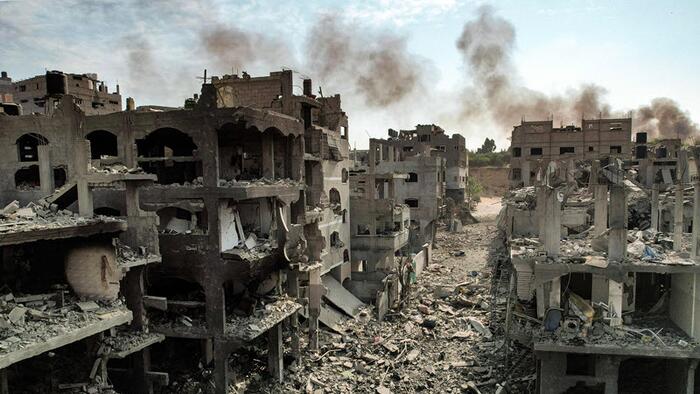


By Michael Every at Rabobank
Si vis bellum, para bellum
Middle East crisis remains top headline in the financial press. What else can the Financial Times do but prioritise that: ‘Israel ‘preparing ground invasion of Gaza’, says Netanyahu’. That’s the first of three key dominoes (Gaza, Hezbollah, Iran) I already argued lead to the wider regional war the market isn’t pricing for. Said risks are captured in FT headlines further down: ‘US moves to deter Iran ahead of Israel’s invasion of Gaza’, and ‘Biden warns China not to attack the Philippines’. We also have the Wall Street Journal saying ‘Hamas Fighters Trained in Iran Before Oct. 7 Attacks’, while the US source tries to calm things by saying they can’t prove Iran trained them for this particular attack. That all overshadows ‘Russia says it rehearsed 'massive' nuclear strike’, and Armenia saying it sees no advantage to having Russian military bases. At least the US House finally has a speaker, Mike Johnson, so funds can flow where they need to go.
Should the Middle East headlines alone transpire, we are looking at oil at over $150 a barrel, Europe’s TTF gas back at 2022 peak levels, and perhaps even the Suez Canal unusable. Yet markets aren’t pricing for this kind of geopolitics yet for some good reasons.
First, when it gets to nuclear tests, it’s so ‘WW3’ that it’s not worth worrying about. If we are all going to go, the logical thing to do until then is keep calm and carry on trading. But that doesn’t apply to the Middle East, which is linked to a nuclear issue, but isn’t one itself.
Second, most people in markets don’t understand geopolitics, and many in geopolitics don’t understand the Middle East. So, while they have to talk about it, their clients/the public, who also don’t know much, can settle for broad-brush terms like ‘risks’ or ‘tensions’ until the market moves.
Third, clients quite rightly ask me, “How likely is escalation really?” Just because something bad could happen, doesn’t mean it will. We could all get knocked down by a car or a bus on a given day, but we don’t live our lives expecting it to happen. The same is true in markets.
However, my reply since day one of this crisis remains the same: the likelihood of Middle East escalation is far higher than the market sees, in a direct echo of what we warned of a month before Russia invaded Ukraine in February 2022.
Indeed, one needs to look at the abilities and motivations of the key players, and ask: can they escalate, and do they want to? In 2022, for Russia the answers were yes and yes. In the Middle East today, the answers are again consistently yes and yes, or yes and very probably:
This all makes the current crisis potentially much larger, and more probable, than markets are pricing for. So, please ignore simplistic ‘geopolitical analysis’ of asset-price moves in past episodes of Israel-Hamas or Israel-Hezbollah conflict: it fails to hold if we see regional escalation. Equally, ignore assumptions we are just seeing si vis pacem, para bellum (if you want peace, prepare for war). Given the regional view the US may not fight an election-year war that cannot be won quickly, easily, or even at all, it is more likely to be si vis bellum, para bellum from its opponents. And even if a display of US strength can stop escalation, what happens when the US aircraft carriers leave the region?
So, while the market will refuse to shake until the Middle East does, don’t take that as any kind of prediction that the region won’t.
Oil up, US 10-year yields +13bp to 4.96%, the dollar soaring and JPY crumbling to a 33-year low past 150, is about the 12% m-o-m surge in US new home sales --due to high rates shutting down existing home sales-- more than geopolitics. Imagine what we see if Middle East war spreads.
Meanwhile, back in si vis pacem in other parts of the world, the US announced it, Australia, and Japan will be increasing security cooperation, as Australia’s government signed a A$5bn deal to boost national cyber-security, and agreed to invest A$2bn in mining and processing critical ‘green’ minerals aimed at reducing Western reliance on China, and to move up the value chain in energy and manufacturing. Expect much more of this ahead.
Perhaps not the way Europe is though, where the WSJ claims ‘Controversial Chip in Huawei Phone Produced on ASML Machine’, and the SCMP: ‘EU includes companies linked to Beijing on board of Global Gateway, its alternative to China’s Belt and Road Initiative’. There’s a reason nobody talks about Pax Europa.
